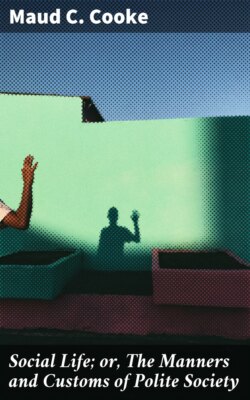Читать книгу Social Life; or, The Manners and Customs of Polite Society - Maud C. Cooke - Страница 89
На сайте Литреса книга снята с продажи.
Dinners.
ОглавлениеTable of Contents
Ladies who give many dinner parties usually keep on hand the engraved invitation cards, with blanks left for the insertion of name and date. The invitation for a dinner party is always sent out in the name of both host and hostess, and the usual form is as follows:
Mr and Mrs Grant White Request the pleasure of your company at dinner, On—— evening——, At eight o'clock. 81 Graceland Court. R.S.V.P.
The letters R.S.V.P. are simply the initials of the French words, Repondez s'il vous plait, meaning, "Reply, if you please."
Some very stylish people now use, in place of these letters, the English phrase: "The favor of answer is requested."
Written invitations, or those engraved for a single occasion, would read as follows:
Mr and Mrs Philip Vance Request the pleasure of Mr. and Mrs. Otis Sullivan's Company at dinner, On Tuesday, March 6th, at 8 o'clock. 34 Ashland Boulevard. The favor of an answer is requested.
R.S.V.P. can be substituted for the last phrase, if desired. If the host be a widower with a young lady daughter, the invitation can be issued in the name of father and daughter, as: "Mr. and Miss Van Vleit, etc.," or, a lady and her daughter, under similar circumstances, would issue invitations in the name of "Mrs. Holt and Miss Holt."
Persons who make a point of strictly observing the usages of polite society are extremely careful, having received any invitation, to take immediate notice of it, according to proper form. This is only a courtesy due to the one who has sent the invitation, which should be accepted or declined promptly, in order that the hostess may know what to depend upon.
If the dinner party is given to introduce either a friend or some person of distinction, an extra card, inscribed as follows, is enclosed in the same envelope: To meet Mr.——. Another form would be:
Mr. and Mrs. Jackson Request the pleasure of Mr. and Mrs. Brown's Company at dinner, To meet Robert Browning, Thursday, October 8th at seven o'clock. 692 Arch Street. R.S.V.P.
It is well, if the party is given in honor of some celebrated person, to give them the choice of several dates before issuing the general invitation, thus assuring yourself that no conflicting engagement will rob the entertainment of its bright, particular star. An invitation to a dinner is the highest social compliment that can be offered. It should be sent out about ten days in advance, and requires an immediate and positive answer, for it is to be supposed that the hostess wishes to make up her table at once. Both invitation and answer should be sent by messenger; all other invitations, and replies to the same, may be sent by mail. In London, however, where distances are so great, all invitations, without exception, are sent by post.
In case of an informal dinner, a verbal invitation is sometimes sent, one or two days beforehand, by a servant, and a verbal answer is given at the time. The principal objection against this method is that the date, having no written reminder, may be confounded with some other engagement. Where the affair is not too stately, an informal invitation, written in the first person, may be pleasantly exchanged between friend and friend. For instance:
My Dear Mrs. Roe:
My aunt, Mrs. LeFevre, of New York City, is here with me for a short stay, and Mr. Doe and I hope that you and Mr. Roe can give us the pleasure of your company at dinner, on Tuesday, October ninth, at seven o'clock, when, with a few other friends, we hope to pass a pleasant hour in your society.
Cordially yours,
Marian Doe
Mrs. Marian Doe, St. Caroline's Court.
